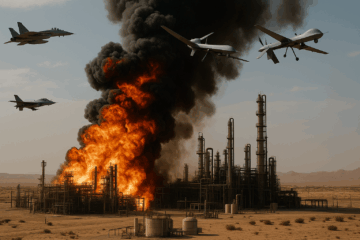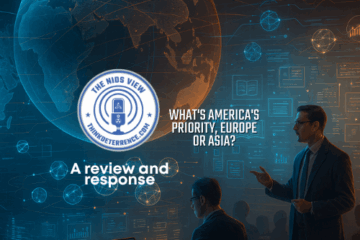With the recent anniversaries of the atomic bombings of Hiroshima and Nagasaki, it is time to reflect on the role of nuclear weapons in national security. These weapons are far more than bigger bombs. As one eyewitness in Hiroshima described it, “surroundings turned blindingly white, like a million camera flashes going off at once.” The first use of an atomic bomb in warfare was fundamentally different, even if it took the Japanese leadership a little time to realize what they faced. With an explosive yield of 15,000 tons of TNT, Little Boy started a fire that spread over four miles, killing thousands more and destroying many hundreds of buildings, virtually all of which were made of wood and paper.
Today, modernization efforts are underway among all nuclear weapons states (NWS), who must acknowledge how their nuclear-based actions and rhetoric impacts global security through incentivizing proliferation for non-nuclear weapons states (NNWS). Moreover, the world must not forget the effects of actual nuclear use or the potential for catastrophic escalation to follow. Hiroshima and Nagasaki may represent victory achieved by nuclear use to some, but there is no direct analogy to the present day.
On the Horizon?
The potential for nuclear war began in August 1949, when the Soviet Union tested its first atomic bomb. After the Cuban Missile Crisis (1962), bilateral and multilateral treaties focused on nuclear arms control. Such efforts served a vital role then, as they do today, for strategic stability and mutual security.
The cornerstones of nuclear arms control include 2011’s New START, plus the original nuclear agreement, and the 1968 Treaty on the Non-Proliferation of Nuclear Weapons (NPT). Russia suspended participation in New START in August 2022, ultimately exacerbating tensions amidst the war in Ukraine. Russian president Vladimir Putin’s nuclear threats are also increasing nuclear tensions. While the NPT remains active with 191 signatory states, its intention to prevent the further spread of nuclear proliferation is threatened by increasingly aggressive nuclear rhetoric surrounding nuclear strikes and first use. Such concerns stem from Russia’s invasion of Ukraine, as well as its, China’s, and North Korea’s vertical proliferation.
Japan is one of many states with the ability to develop nuclear weapons and is experiencing increasing incentives to do so. The cost-benefit analysis of nuclear proliferation is a frequent focus amongst theorists, with the commonality being credible existential threat(s) to a state. Japan experiences this regionally from China and North Korea and more broadly from Russia. Though the United States provides a nuclear umbrella to its Pacific allies, which it continuously reaffirms, discussion in South Korea and Japan suggests growing support for independent nuclear arsenals. This adds to the concern that Japan, for example, might develop its own nuclear weapons.
The Japanese Perspective
Even with existential threats posed by nuclear-armed adversaries, most Japanese citizens are opposed to nuclear proliferation and nuclear use. According to public opinion polls, 75 percent of Japanese citizens support the Treaty on the Prohibition of Nuclear Weapons (TPNW). They believe so strongly in the nuclear taboo that 58 percent denounce nuclear use, even in retaliation to a nuclear attack.
This sentiment is strong in no small part because of their very direct experience through Hiroshima and Nagasaki. Survivors of the Hiroshima bombing—alongside Nagasaki—advocate for peace. They see warfare and the employment of nuclear weapons as unavoidably devastating to civil society. Survivor Toshiko Tanaka advocates for peace through nuclear disarmament, arguing that the world must remain consciously aware of nuclear war’s aftermath. The city of Hiroshima also holds annual commemorations on the bombing’s anniversary—along with housing museums and memorials intended to be a stark reminder of the consequences of war.
“The Only Winning Move is [Still] Not to Play”
Japanese surrender in 1945 stemmed from several factors that cannot be replicated in the age of multiple nuclear-armed states. Imperial Japan started the war in the Pacific with invasions of China and other Asian nations before eventually launching a surprise attack on the United States. By the time Japan surrendered, it took the emperor imposing his will on a military that sought to fight to the bitter end. For some of the military leadership, the physical effects of the atomic bombs were comparable to the firebombing long underway.
Today, however, nuclear weapons are far larger and more numerous, making the effects far greater for any society that may experience nuclear employment. Thus, avoiding highly destructive conventional wars with the potential for uncontrolled nuclear escalation is important.
The threat posed by nuclear weapons to non-nuclear states may be much higher than previously believed. The Russian invasion of Ukraine and Russia’s threats to use nuclear weapons against a non-nuclear Ukraine are worrisome. Expanding Chinese and North Korean nuclear arsenals and Iran’s likely nuclear breakout are also worrisome. Moreover, some US political thinking combines with its ballistic missile defenses to lean into isolationist tendencies that stress extended deterrence credibility.
Any nuclear use is likely to receive strong condemnation from the international community. The consequences of international condemnation and the uncertain consequences for use may be enough to prevent the employment of nuclear weapons, but there is no guarantee. Whether limited or large scale, the use of nuclear weapons will likely end efforts to prevent nuclear proliferation, including 79 years of historical precedent prioritizing diplomacy, reduction, and verification. This would be a world that neither NWS nor NNWS should wish to see. And to its survivors, remembering the Hiroshima of 1945 serves as a stark reminder of the cost of nuclear employment.
Deterring the use of nuclear weapons must remain a priority for the United States. The optimism for disarmament that won former President Barack Obama the Nobel Prize in 2009 has mostly eroded, and nuclear-armed adversaries show little interest in resuming talks much less action. Therefore, the United States must accomplish its nonproliferation objectives through the strength found in its nuclear modernization and commitments to allied defense.
Amanda Hart is a recent graduate from Virginia Tech, currently working in the field of C-WMD planning and support. Views expressed are the author’s own.




